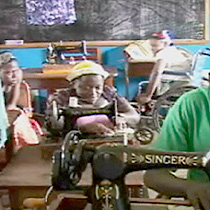2007年VOA标准英语-Ugandan Laws Aim to Help Physically Handicapped
搜索关注在线英语听力室公众号:tingroom,领取免费英语资料大礼包。
(单词翻译)
By Cathy MajtenyiUganda
26 June 2007
The Ugandan government has taken a progressive approach to helping1 the disabled by passing legislation that recognizes the rights of the disabled, providing representation for them in Parliament and specifying2 measures to enable them to be more mobile. But disabled advocates say these measures are often not implemented3 in everyday life, and people with disabilities continue to face discrimination and other struggles. Cathy Majtenyi recently visited Uganda and files this report for VOA.
| The Kampala School for Physically Handicapped |
The Ugandan government has been active on this front, with the passage in 2003 of the National Council of Persons with Disabilities Act, the Disability Act of 2006 and the creation of the National Council of Disabilities, which monitors and evaluates government activities and programs regarding the disabled.
 |
| Handicapped students learn to use sewing machines |
He and his colleagues educate fellow lawmakers about the disabled and ensure that all laws in Uganda take into account people living with disabilities.
"For example, if we are having a law on infrastructure6, we as members of Parliament, the five of us, must ensure that this structure is accessible to persons with disabilities,” says Ndezi. “This law applies to all other structures that that will be carried or constructed in this country."
But many disabled activists8 say that, in practice, many of the laws and programs are not being implemented and that a large number of people living with disabilities are begin excluded from mainstream9 society.
Francis Kinubi is chairman of the National Union of Disabled Persons of Uganda. He gives the example of how traffic lights in Uganda are supposed to have alarms to warn the blind, but this and other measures do not exist in everyday life.
"Children with disabilities are not yet fully10 admitted in schools as inclusive education recommends,” says Kinubi. “Children with disabilities still have challenges, for example; accessibility to classrooms is still a problem where there are very many stairs to the classrooms and people with wheelchairs cannot reach them."
Kinubi says he thinks legislative11 measures are not being implemented because government bodies and civil servants are often unaware12 of the laws, and also that there is not enough money in the system to fund the initiatives.
Advocates for the disabled say that as a result of widespread discrimination and lack of employment and schooling13 opportunities, many people living with disabilities end up being among the poorest in the country.
That is a big concern for Annet Nakanwagi, a local politician representing the disabled in Mukono District. She says she is particularly concerned about the plight14 of disabled women and children, and that it is vital for people living with disabilities to be able to earn an income.
"I want all the disabled children to go to school,” says Nakanwagi. “Then next I want to see that the disabled women, also they are well off (and) catered15 (for). You see, the men abuse the disabled persons, so I want enforcement to touch on them. My vision also (is that I want) all the disabled persons to be well located - to join these government programs, to be well off. There are some who can dig, go to gardens, who can do other craftwork so that they get money. I want all the disabled persons to be well off and to get money, not to be on the streets just begging, which is not good for them."
| Fred Namugera, one of the founders of the Spinal Injuries Association of Uganda |
"When I came home after being discharged, I was discouraged by my companion and my relatives in the sense that, somebody was working, doing some good work, now I can no longer do anything,” says Namugera. “They said, it's better that this man died - God was not kind to him. So that thing really gave me, on the other hand, courage: to know that, how really should I tell these people that death is not better than someone who is living."
Many people living with disabilities in Uganda face such discrimination, but with hard work and determination are forging ahead to build good lives for themselves and their families.




